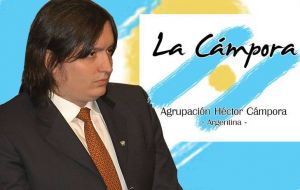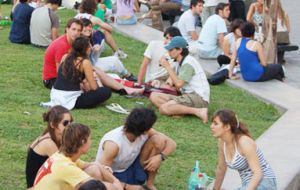MercoPress. South Atlantic News Agency
Argentine first time 'young voters' remain distant from Sunday's mid-term election
 Youth group La Campora is a hand-out-jobs club, under the leadership of Maximo Kirchner
Youth group La Campora is a hand-out-jobs club, under the leadership of Maximo Kirchner Argentines aged 16 and 17 will be able to vote for the first time in Sunday's midterm elections but the incidence of their ballot in the final result is considered marginal since many of them did not register. In Argentina voting is mandatory for the 18 to 70 age group, and 600.000 teen agers of 16 and 17 have registered to vote on 27 October when half the Lower House and a third of the Senate seats are renewed.
Last August primaries, an anticipation of Sunday, the 'young voters' were allowed to express their opinion based on a September 2012 bill but it is not known effectively how many went to the ballot box. According to the Electoral Chamber the youngsters who voluntarily registered to vote represent 2% of the 30.5 million Argentines in the electoral roll. In Argentina the 16/17 age group totals 1.38 million and to vote they had to register.
“In the August primaries was the first time the over 16 could vote, but the truth is participation was limited. What was expected to be a sort of cascade of young people votes finally did not happen”, according to Virginia Garcia Beaudoux, member of the Belgrano University Public Opinion Centre.
The age group 18 to 35 represent a third of Argentina's electoral roll, but despite this the concerns, problems, aspirations of that age group seem to be absent from the campaign and their participation in political parties activities is even weaker.
The activity of young voters in politics did have a peak when the presidential election of 2011, which saw Cristina Fernandez re-elected by an overwhelming 54% of votes and had the youth group La Campora, supported by her Kirchnerite administration, play an active role.
However this time the political group under the leadership of Maximo Kirchner, the president's eldest son, had a very low profile in the campaign.
“Youth participation is very much conditioned by what is today its most prominent expression, La Campora which to be honest does not seem a good example of political debate or for the formation of future cadres and helping young people train to ascend in positions of leadership”, said Jorge Arias from Polilat.
“The kirchnerite La Campora is more like a give-out-of-jobs club trying to make it into a centre of power and this obviously is not the best example for young people to participate actively in politics”, he added.
According to Orlando D'Adamo co-director of Copub, the other nuclei of 'young voters' are concentrated in the extremes: on the one side 'very much to the left' such as with the Workers Party (almost Trotskyite) and on the other, the Republican Proposal, PRO, a conservative force led by Buenos Aires City mayor Mauricio Macri.
Arias also pointed out that the 'youth vote' participation in other opposition parties is even more weakened than in the ruling coalition, basically because “there are less spaces of power to distribute”.
Young people don't feel identified in Sunday's election, not only because of the results, but also because they were mostly absent from drafting the campaign agenda and proposals, added Arias.
“Young people are the essence of candidates campaigns, but unfortunately on this occasion they have not been convened or don't feel attracted to discuss ideas to elaborate on proposals that help young people incorporate into the social, political institutional and economic spaces”.





Top Comments
Disclaimer & comment rules-

-

-

Read all commentsMaximo would never win a beauty contest would he.
Oct 25th, 2013 - 10:28 am 0I would say 90% of those 16 year old that actually bothered to register are voting the Ks
Oct 25th, 2013 - 12:30 pm 0@2 I agree and also think that is a pretty high proportion that registered to vote considering the age group.
Oct 25th, 2013 - 12:35 pm 0Commenting for this story is now closed.
If you have a Facebook account, become a fan and comment on our Facebook Page!